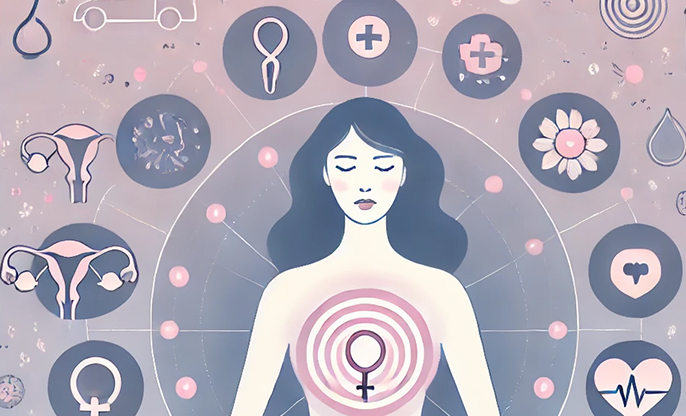
Throughout our lives, we as women face a sea of symptoms linked to hormonal fluctuations, especially during times like perimenopause and menopause. Understanding how to manage these symptoms effectively can make a significant difference in our quality of life and overall well-being.
1. Menstrual and
Reproductive Changes
From irregular periods to shifts in fertility, adapting our lifestyle, tweaking our diet, and occasionally using medications can help stabilize our cycles. It's important to talk with a healthcare provider about concerns like fertility. For vaginal dryness or a decrease in libido, using water-based lubricants and maintaining open communication with our partners can make intimacy more comfortable. Hormonal therapies might also offer relief.
2. Vasomotor
Symptoms
Hot flashes and night sweats can disrupt our daily life. Wearing layers, keeping our sleeping environment cool, and steering clear of spicy foods and caffeine can lessen these discomforts. For some of us, hormone replacement therapy (HRT) or certain medications like SSRIs could be beneficial options, though it’s crucial to discuss these with a doctor.
3. Psychological and Cognitive Symptoms Fluctuations in mood, and bouts of depression or anxiety are not uncommon. Staying active, practicing mindfulness, and sometimes engaging in counseling can support our mental health. When needed, medications for depression or anxiety can be life-changing. Keeping our minds sharp with cognitive exercises and ensuring we get enough sleep are keys to managing concentration and memory issues.
4. Physical Changes and Discomforts If sleep disturbances trouble us, establishing a calming bedtime routine and making our sleep environment inviting can help. For thinning hair and dry skin, gentle, hydrating products and protecting our skin from the sun are beneficial. Supplements and topical treatments might also be worth considering.
5. Metabolic and Systemic Changes With changes in metabolism often leading to weight gain, maintaining a balanced diet and regular exercise routine is essential. Consulting a doctor for potential thyroid issues or personalized dietary recommendations can be helpful. For urinary issues or changes in bone density, pelvic exercises, dietary supplements like calcium and vitamin D, and staying physically active can be effective.
6. Cardiovascular and Blood Sugar Regulation Keeping an eye on our heart health through regular check-ups, sticking to a heart-healthy diet, and exercising can keep cardiovascular diseases at bay. Managing our blood sugar levels by monitoring our carbohydrate intake and staying active is crucial, especially as we age.
By embracing a comprehensive approach and maintaining regular check-ups, we can navigate these challenges more smoothly. Having a supportive network and making informed lifestyle choices empowers us to manage our symptoms effectively. This proactive approach not only eases the symptoms but enhances our vitality, letting us thrive through all of life’s stages.


